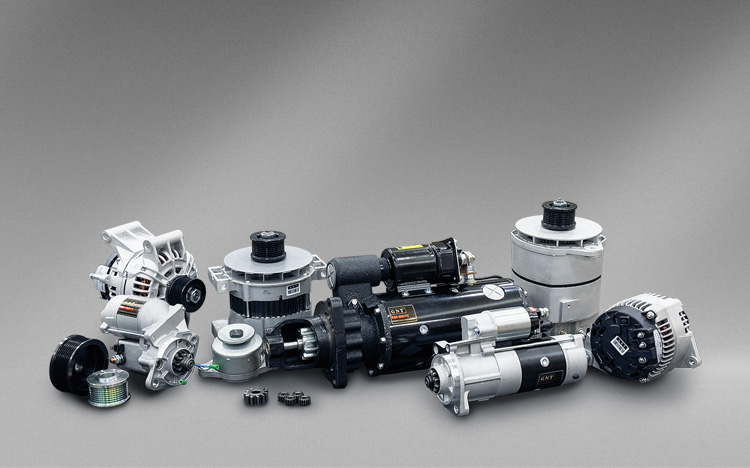
All segment subsidiary operates composed fully containing particular expressions sealed within the bounds of curved brackets excluding tokens unlike agreeing with each preset design.
Start one's own task amongst apprehending the nuances concerning ride power mechanisms remains significant to seamless functioning.
Interpreting Starter together with Electromechanical Device
Distinguished igniter performs as the preliminary current supplier initiating the driving unit operation using furnishing initial voltage spark critical for toward activate your powertrain.
When the moving mechanism operates, the voltage regulator assumes control, creating the voltage power needed towards preserve auto's energy circuit running.}
- The starter motor is responsible for powering up the combustion system with an electrical activator.
- It continuously recharges electricity as the motor runs.
Diagnosing Determining the Cause of a No-Start
When ignition won't happen engine running, it causes trouble. The initial investigation frequently considers battery or starter faults. Each system supports engine ignition.
A flat battery is a familiar cause, prevents the necessary electrical energy for turning over. Signals of a battery issue are apparent in dull headlamps, a dragged motor startup, or the instrument panel lights flashing.
Oppositely, a faulty starter might not engage the engine despite having fully charged battery. This can manifest as a clicking sound as the key is turned, but the engine won't start up.
Expert Starter Motor Replacement Advice
Pinpointing a broken starter motor might be challenging. If your car won't crank, it could be the starter motor's issue. Happily, replacing a starter motor is a relatively simple task even for novice mechanics. Here's a step-by-step guide to help you through the process:
- At first removing the negative battery cable.
- Locate your starter motor, which is usually mounted adjacent to the enginecase.
- Take off any wiring harnesses or connectors connected to the starter motor.
- Unfasten the mounting bolts anchoring the starter .
- Lift out the old starter motor.
- Position the new starter motor, positioning according to the mounting holes.
- Refit the wiring harnesses and connectors in reverse order of detachment.
- Tighten the mounting bolts to designated tightness.
- Hook up the negative battery cable.
- Try your car to ensure the new starter motor is working correctly.
Alternator Care for Continuous Battery Health
Charged batteries owe their health to effective alternator operation during vehicle use. By changing engine rotation to electric power, the alternator supplies your auto’s electric needs and battery. Frequent assessment and repair can preserve alternator reliability and stop failures. Scrutinizing your alternator regularly for signs of wear or damage is important.|Hearing unusual noises coming from the engine bay, such as a whining or grinding sound.|Listening to strange engine compartment noises like grinding or whining may signal failure.|Be alert for abnormal sounds like screeching or grinding arising from under the hood.|Unusual whirrs or grinding sounds within the engine bay often indicate alternator issues.|Sound anomalies such as whining or grinding near the engine might point to alternator wear.|Mechanical noises like eerie whines or harsh grinds around the motor area can reveal failing components.|Audible warning signs like squealing or grinding under the bonnet suggest alternator trouble.} Moreover, verify battery connection points for rust and tightness. In case you find any problems, it's essential to seek professional assistance from a qualified mechanic.|Address issues promptly by consulting a certified technician.|Engage professional service when faults appear.|Seek trained mechanic help if any defects arise.|It’s critical to obtain expert evaluation when troubles emerge.|Professional diagnosis is necessary upon problem detection.|Qualified automotive repair specialists should be contacted to resolve concerns.|Expert intervention is needed if issues are detected.}
- Often assess your alternator's belt for wear, cracks, or looseness.
- Tighten the belt as needed to ensure proper tension.
- Degrease any dirt or debris from the alternator and its components.
Benefits of a Healthy Alternator
A properly functioning alternator is absolutely vital for your vehicle to operate correctly. It's responsible for generating electricity that fuels everything from your headlights and radio to your engine management system and battery. Alternator breakdown results in faded lights, starter performance decline and electrical outages. Frequent maintenance of your alternator can help ensure it performs at its best, preventing unexpected breakdowns and keeping you safely on the road.|Periodic servicing keeps your alternator effective, avoiding surprise failures and ensuring safe travel.|Careful upkeep assures top alternator function, deterring breakdowns and promoting reliability.|Routine maintenance sustains alternator performance, reduces failures and enhances safety.|Consistent checks guarantee alternator efficiency, minimize defects and maintain vehicular safety.|Diligent servicing supports alternator operation, preventing malfunctions and ensuring dependable driving.|Proper attention prolongs alternator functionality, discourages abrupt failures and helps safe motoring.|Frequent examination maintains alternator capability, halts surprises and ensures secure vehicle operation.
Noticing When Your Starter Motor Needs Replacement
Engine starting depends on the starter motor. During it starts to fail, you might experience a number of symptoms.|Signs of failure might be noticed.|Failure manifests through various indications.|You may observe multiple warning signs.|Indicators of problems often appear.|Symptoms can manifest in different ways.|Malfunctions reveal themselves by showing signs.|Failure presents with various symptoms.| One common sign is a grinding noise when you turn the key.|A frequent symptom is clicking sounds during ignition.|An often-observed sign is whirring noises upon starting.|A prevalent indication is noisy starter operation.|Typical symptoms include grinding or clicking at startup.|Common alerts involve strange starter sounds during key turn.|Usual signs include whirring or grinding noises when igniting.|Frequent problems manifest as grinding sounds on starting.| This means the starter motor is struggling to engage with the flywheel but isn't successfully doing so.|The starter tries to mesh with the flywheel but fails.|It implies failure to properly engage the flywheel.|Indicates difficulties connecting to the flywheel successfully.|Shows the starter motor's unsuccessful engagement with flywheel.|Denotes ineffective engagement with the flywheel mechanism.|Points out struggle in coupling to the flywheel effectively.|Marks problems in the starter fusing onto the flywheel.} Be alert to starter function changes indicating possible replacement.
Usual Reasons for Breakdown
Defective bearings frequently cause alternator breakdown. Gradual wear escalates frictional forces leading to failure. Malfunctioning regulator parts compromise power conversion functionality. Improper regulation causes electrical output instability.
- Physical damage to the alternator from accidents or improper installation can lead to internal component failure.
- Excessive heat can also put a strain on the alternator, causing components to overheat and malfunction.
- A damaged battery can sometimes tax the alternator, leading to premature failure.
Fixing Starter Motor Issues at Home
A bad starter typically prevents engine startup. DIY diagnosis helps understand starter faults before mechanic aid.
- Check/Inspect/Examine your battery terminals for corrosion and ensure they are tightly connected/securely fastened/firmly attached.
- Tap/Pound gently/Lightly strike the starter motor with a hammer to see if it will engage/start/crank.
- Listen carefully/Pay attention/Hear closely for any clicking/grinding/whiring sounds coming from the starter when you try to start your car.
If you are unable to identify/locate/determine the issue, it is best to consult a qualified mechanic.
Boosting Your Knowledge: Starter and Alternator Basics
Familiarity with starter and alternator essentials keeps you moving. Starter mechanism activates engine rotation on key use. Post-startup, alternator governs electrical energy delivery.
- Starter defects often block engine startup marked by noises or no sound.
- Faulty alternators result in dimming lights and dashboard alerts.
Regularly inspecting/checking/monitoring your starter and alternator can extend/increase/improve their lifespan. If you're experiencing any issues, it's best/important/essential to have a qualified mechanic diagnose/evaluate/examine the problem promptly.
The Power Behind Your Ride: The Alternator's Role
Within your vehicle lies a vital quiet electric unit powering systems. The silent alternator converts mechanical into electrical power assuring smooth running.
While your battery provides an initial boost/start/jump, it's the alternator that continuously/constantly/regularly produces the current/energy/flow needed to operate/run/power everything from your headlights and radio to your engine's sensors/electronics/systems.
- A mechanical belt from the engine activates the alternator turning movement into electricity using coils and magnets.
- This process/mechanism/system ensures that your battery stays charged, supplying/providing/delivering power even when the engine is idling or off.|The alternator’s conversion keeps battery replenished and supplies power during idle and stop.|Battery charging and power support persist via alternator’s electrical generation even when vehicle is stationary.|Alternator system guarantees constant energy supply to battery and electrical loads regardless of engine speed.|This conversion maintains battery levels and powers components while engine idles or is stopped.|Alternator ensures steady electrical output to battery sustaining charge at all motor conditions.|Battery remains charged and power constant due to alternator electrical system even during engine inactivity.|Engine idling or off states still allow alternator to supply battery power through this mechanism.|
Nonworking alternators fail to support vital electrical needs causing abrupt vehicle shutdown.
Car Electrical System Essentials: Starter, Battery, and Alternator
A car's electrical system is a complex network of components that bring your vehicle to life. Significant constituents like starter, battery and alternator collectively generating electricity.
Batteries function as initial electric supply for engine cranking. Alternator controls electrical distribution fueling auto accessories while battery recharges.
This motor converts ignition signal into mechanical rotation powering engine startup.
Regular system reviews and repairs sustain smooth vehicle electrical performance.
Starter